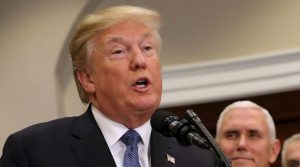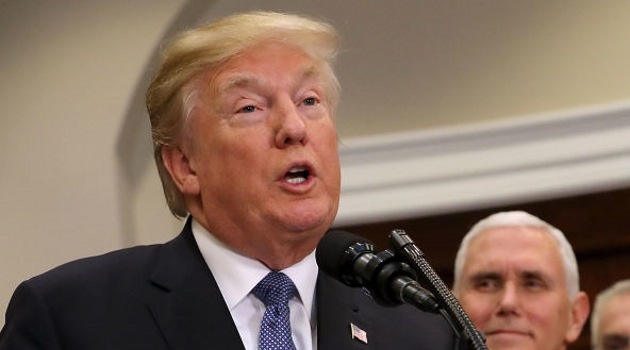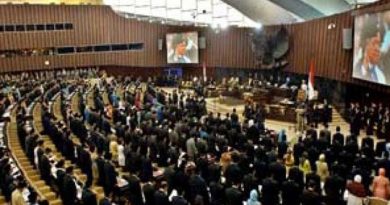Trump to Announce Iran Deal Decision on Tuesday

President Donald Trump will announce on Tuesday whether the U.S. will leave the 2015 Iran nuclear agreement, a signature achievement by his predecessor that he’s long derided as “the worst deal ever.”
Foreign leaders and analysts say the president is likely to exit, casting the future of an accord widely seen as reining in Iran’s nuclear program into doubt. Trump has said the deal doesn’t do enough to address threats from the Islamic Republic’s ballistic missile program and the country’s involvement in regional conflicts.
The president said in a tweet Monday that he’ll announce his decision at 2 p.m. in Washington, ahead of a May 12 deadline set by U.S. law. He could still surprise his allies by agreeing to stay in the accord a while longer as American and European diplomats try to negotiate side agreements aimed at addressing his concerns. Both sides in those talks have signaled that they are close to a breakthrough, though it may be too late to salvage the broader accord.
Oil prices have climbed in recent weeks as uncertainty over the future of the agreement rose. A resumption of U.S. sanctions would threaten Iran’s ability to attract foreign investment, keeping the country’s output flat or lower through 2025, according to a research note published Monday by Barclays.
Trump reiterated his frustration with the agreement on Monday, calling it the “very badly negotiated Iran Deal” in a Twitter post, and singling out former Secretary of State John Kerry for being “the one who created this MESS in the first place!”
French President Emmanuel Macron and German Chancellor Angela Merkel signaled after meeting with Trump last month that he seems intent on quitting the agreement, which curbed Tehran’s nuclear program in exchange for relaxing Western financial sanctions. A European diplomat said Monday that the chance Trump remains in the agreement is very small and added that there was little clarity on the administration’s ‘Plan B.’
Under legislation passed by Congress, Trump has until Saturday to decide whether to keep waiving sanctions on banks of foreign countries that haven’t reduced Iranian oil imports, according to an analysis by the Congressional Research Service. Under that law, those sanctions have to be waived every 120 days.
‘Will Not Survive’
Trump last agreed to waive the sanctions in January, but his frustration with the agreement has only grown since then. If he now decides against waiving the restrictions, an assessment of whether foreign countries are violating the sanctions would be due Nov. 8, according to the CRS study.
But “regardless of his decision, the current Iran deal will not survive under President Trump,” Barclays wrote in its report.
Trump has long criticized the nuclear accord, which was forged under President Barack Obama. In addition to saying the agreement didn’t address Iran’s missile program or meddling in other nations, he’s also complained that it freed up Iranian money abroad for military purposes and said “sunset clauses” in the deal allow the country to resume some uranium enrichment after 2025, setting the stage for a nuclear weapons program.
Following the visits by Merkel and Macron, U.K. Foreign Minister Boris Johnson was in Washington this week to make a last-ditch argument to persuade Trump to remain in the accord, arguing that it is flawed but can be improved by additional side agreements that have been under discussion for months.
“We need to find a way of fixing that, and the president has been right to call attention to it, but you can’t just do that without throwing the baby out with the bathwater,” Johnson said Monday in an appearance on Fox News.
Johnson met this week with Vice President Mike Pence, National Security Adviser John Bolton, Secretary of State Mike Pompeo and other administration and congressional officials.
‘Fixed or Nixed’
Israeli Prime Minister Benjamin Netanyahu said Sunday that the 2015 accord is fatally flawed and must be “fully fixed or nixed” to stop Iranian aggression sooner rather than later. His comments came as Iranian President Hassan Rouhani warned that the U.S. would face “historic” regret if it pulled out.
While analysts are betting Trump will quit the deal, the president said last week that his opposition “doesn’t mean I wouldn’t negotiate a new agreement.”
Members of Trump’s own party are split. Representative Mac Thornberry, chairman of the House Armed Services Committee, said Sunday he “would counsel against” Trump quitting the accord. But House Majority Leader Kevin McCarthy said he’s “very comfortable” that the president is standing up to Iran.
Speaking to reporters on Sunday, Netanyahu said the agreement fails to address the potential weaponization of Iran’s nuclear knowledge, imposing only temporary limits on uranium enrichment.
“I say that a deal that enables Iran to keep and hide all its nuclear weapons know-how is a terrible deal,” Netanyahu said. He delivered a televised presentation last week on secret Iranian files his country’s intelligence services obtained that he said prove that Tehran sought to build a nuclear weapon in the past despite its government’s denials.
The agreement must be “either fully fixed or fully nixed” because otherwise, “you will end up with Iran with a nuclear arsenal in a very short time,” he said.
‘Non-Negotiable’
Iran, however, has ruled out new talks, calling the current agreement “non-negotiable.”
Rouhani, addressing crowds at a rally Sunday in the northeastern city of Sabzevar, said the U.S. has “always sought to sow intrigue against Iran” and would make a mistake by exiting the agreement.
“If it wants to leave the nuclear deal, it will quickly see that this decision will be a regret of historic proportions,” Rouhani said.
The European diplomat, who asked not to be identified, said it’s not clear what will happen should Trump reimpose sanctions on Iran. The president and his top national security aides haven’t explained how his administration will proceed should he withdraw from the deal, according to the official.
“I am sure of one thing: every available alternative is worse,” U.K. Foreign Minister Johnson said in column published by the New York Times on Sunday. “The wisest course would be to improve the handcuffs rather than break them.”
Side Deals
U.K. officials think “we can find some language, produce some action that meets” Trump’s concerns about the deal, Kim Darroch, the British ambassador to the U.S., said on CBS’s “Face the Nation” on Sunday.
“We haven’t got there yet,” Darroch said.
By leaving the accord, the U.S. would lose visibility into what Iran is doing, Representative Thornberry said.
“I thought it was a bad deal,” he said. “But the key question is, ‘OK, now we are where we are, what happens next if the U.S. pulls out?’”
Courtesy : Bloomberg
Photo : Wow Keren
[social_warfare buttons=”Facebook,Pinterest,LinkedIn,Twitter,Total”]



